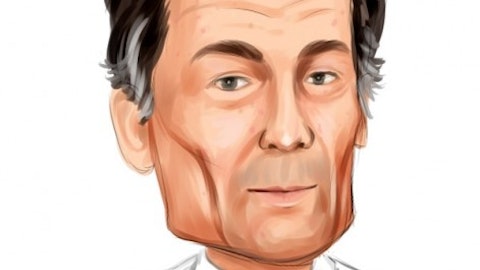Ted Sarandos: I think Leo has resonated for the same reason that CB’s did last year. It’s great. People really love it. It brings a lot of joy to families. And yes, they do watch them over and over again, which drives a lot of engagement, but also drives a lot of attachment. I think that Leo and CB’s are proof points that we have the flywheel to create original IP in that animated space, and there is so much appetite for animated feature. Seven of the top 10 most watched movies since Nielsen has been tracking streaming are animated features. So I’m super thrilled with Leo. We’re kicking around the Leo 2 right now and a film that works on so many levels. The animation – the art of the animation is beautiful. The comedy is funny and families just really love it. So we look forward to a lot more. We have Spellbound coming up next year. We’re just really thrilled with our – that the animation team is now firing on all cylinders.
Spencer Wang: Moving along to engagement. This question is from Bryan Kraft of Deutsche Bank, and I’ll direct this one to Ted. What have the engagement trends been like globally and domestically? Has it been steady, increasing or decreasing? And how has paid sharing impacted engagement per member?
Ted Sarandos: Yes. So we’re really thrilled with our engagement trends domestically and globally. This is really a story about viewing moving from linear television to streaming. The story has been constant and it continues. It’s also a story about Netflix kind of leading the way with professional film and television and now games. Our engagement is a bit impacted by our paid sharing. Think about it like fewer households using the same account. So as those folks spin off and get their own accounts and we win them over with our programming, that will normalize and continue to grow. We’re really pleased with our engagement. We have shown you in graphic detail what that engagement looks like on a title-by-title basis in this engagement report we just released.
And I think you see in that report about two hours of daily engagement with our members, which is great. And you’ve seen that some of our hits and even our near hits are attracting enormous audiences. So we have to keep pleasing them, and we have to do that in multiple languages in multiple countries and all over the world. And that’s we’re excited about, and it’s showing up in that engagement.
Spencer Wang: Great. Let’s move on to gaming. A couple of questions on gaming. First from Justin Patterson at KeyBanc for Greg. The gaming portfolio expanded significantly last year and even added more mainstream titles like Grand Theft Auto Trilogy. How are you thinking about sizing the investment in this area how has engagement changed over the past year? And what are the signals you’re evaluating to gauge when it’s time to monetize?
Greg Peters: Yes. Well, we’re stoked by the performance of GTA. We had high hopes, but it exceeded even those high hopes. So that’s a – it’s a great place to be. So the biggest download and engagement numbers that we’ve seen so far. We were in the top mobile game downloads for several weeks, which shows it was not only big for us, but big numbers for mobile gaming in general. And beyond any specific title, we’ve tripled game engagement over the last year. So that’s a solid growth trajectory for us. Games, it’s a huge opportunity, $140 billion in consumer spend, ex-China and Russia. And we believe we can build games as strong components, and other content category to deliver entertainment value to our subscribers. But to your question on size of investment, we thought about this as we’ve got to allocate enough to the initiative to ensure that we’re playing to win, that we have enough activity in the space that we’re learning and growing, but also recognizing that we had a tremendous amount to learn and a tremendous set of institutional capabilities to develop.
And we wanted to make sure that we weren’t growing that investment significantly before proving to ourselves that we can actually effectively translate that investment into member value. So things are going well. We continue to see this level of engagement growth and we continue to see what we’ve been seeing so far, which is evidence, as we would expect, that, that engagement leads to business benefits like increased retention, then we’ll be able to scale that investment appropriately. Having said all of that, it’s still, I’ll use the early days, words that we love to use. And it’s worth noting that our games investment is a very small fraction of our overall content budget right now.
Spencer Wang: Great. Greg, a second question on gaming from Michael Packer of Wedbush. He asked, given the outperformance of Grand Theft Auto Trilogy on the Netflix service, will you reconsider your focus on games available exclusively on the service? Asking you will seek to emulate the success of Grand Theft Auto by offering games like Candy Crush or Fortnite on Netflix as well?
Greg Peters: Yes. Licensing games, existing games with often with some form of exclusivity, that’s been a key part of our strategy, and it’s going to continue to be so. We’ve clearly seen, one of the things that we’ve learned is that recognizable games, that’s either existing popular game titles or game franchises or games that are based on well-known IP, and in many cases, that’s IP from our own films and series, those are the ones that are working the best for us right now. So we’re going to continue to find the right opportunities to bring those kind of titles to our members. We’re going to look for more great licensing and some exclusive licensing, so we can do things more like what you’ve seen us do last quarter with GTA, but also other titles like Football Manager 2024, which performed very well for us.
Money Heist or La Casa de Papel, which was great. You’ll see it this quarter with titles like Virgin River, so that’s definitely the strategy that we’re on, and you’ll see us do more of that work.
Spencer Wang: Great. We have a question also from John Hunlock of UBS. This one, I’ll point to Greg, but Spence, you can feel free to join in as well. The question is, how should we think about pricing changes in the rest of the world now that you are through the majority of the password sharing implementation and in light of the recent price adjustments in the U.S., U.K. and France?




